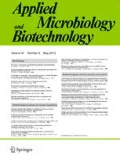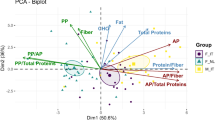Abstract
We are beginning to see how the microbiota of the human gastrointestinal tract (GIT) can drive the development of new products to benefit human health and wellbeing. Despite the growing market for prebiotics and probiotics, there are currently no commercial products available that aid or increase the attachment of health-promoting bacteria to the gut mucosal surface. Components in milk have the potential to increase commensal adherence in the gut by priming the bacteria or the mucosal surface for colonization. Such compositions have potential for supplementation in many products aimed at individuals at different life stages or those suffering from various disease states where lower numbers of health-promoting bacteria such as bifidobacteria are evident. This review will explore how milk ingredients may lead to the attachment of larger numbers of bacteria with health-promoting properties in the gut.

Similar content being viewed by others
References
Angeloni S, Ridet JL, Kusy N, Gao H, Crevoisier F, Guinchard S, Kochhar S, Sigrist H, Sprenger N (2005) Glycoprofiling with micro-arrays of glycoconjugates and lectins. Glycobiology 15(1):31–41. https://doi.org/10.1093/glycob/cwh143
Babbar HS, Jaswal VM, Gupta R, Mahmood A (1990) Intestinal absorption of macromolecules and epithelial cell surface glycosylation in suckling rats nursed on mothers fed low-protein diet-I. Biol Neonate 58(2):104–111
Ballard O, Morrow AL (2013) Human milk composition: nutrients and bioactive factors. Pediatr Clin N Am 60(1):49–74. https://doi.org/10.1016/j.pcl.2012.10.002
Biol MC, Pintori S, Mathian B, Louisot P (1991) Dietary regulation of intestinal glycosyltransferase activities: relation between developmental changes and weaning in rats. J Nutr 121(1):114–125
Biol-N’garagba MC, Louisot P (2003) Regulation of the intestinal glycoprotein glycosylation during postnatal development: role of hormonal and nutritional factors. Biochim 85(3–4):331–352
Chichlowski M, De Lartigue G, German JB, Raybould HE, Mills DA (2012) Bifidobacteria isolated from infants and cultured on human milk oligosaccharides affect intestinal epithelial function. J Pediatr Gastroenterol Nutr 55:321–327
Enss ML, Cornberg M, Wagner S, Gebert A, Henrichs M, Eisenblätter R, Beil W, Kownatzki R, Hedrich HJ (2000) Proinflammatory cytokines trigger MUC gene expression and mucin release in the intestinal cancer cell line LS180. Inflamm Res 49(4):162–169
Gonzalez R, Klaassens ES, Malinen E, de Vos WM, Vaughan EE (2008) Differential transcriptional response of Bifidobacterium longum to human milk, formula milk, and galactooligosaccharide. Appl Environ Microbiol 74:4686–4694
Hooper LV, Gordan JI (2001) Commensal host-bacterial relationships in the gut. Science 292:1115–1118
Jaswal VM, Babbar HS, Mann DS, Mahmood A (1990a) Maternal nutrition and development of intestinal functions: II—effect of feeding high protein and high fat diets to lactating rats. Indian J Exp Biol 28(8):776–779
Jaswal VM, Babbar HS, Mahmood A (1990b) Effect of malnutrition and hormone treatments on intestinal microvillus membrane glycosylation in suckling rats. Ann Nutr Metab 34:155–162
Jost T, Lacroix C, Braegger C, Chassard C (2013) Assessment of bacterial diversity in breast milk using culture-dependent and culture-independent approaches. Br J Nutr 110(7):1253–1262
Kavanaugh DW, O’Callaghan J, Buttó LF, Slattery H, Lane J, Clyne M, Kane M, Joshi L, Hickey RM (2013) Exposure of Bifidobacterium longum subsp. infantis to milk oligosaccharides increases adhesion to epithelial cells and induces a substantial transcriptional response. PLoS One 8:e67224
Kavanaugh D, O’Callaghan J, Kilcoyne M, Kane M, Joshi L, Hickey RM (2015) The intestinal glycome and its modulation by diet and nutrition. Nutr Rev 73(6):359–375
Kiousi DE, Karapetsas A, Karolidou K, Panayiotidis MI, Pappa A, Galanis A (2019) Probiotics in extraintestinal diseases: current trends and new directions. Nutrients 11:788
Kong C, Elderman M, Cheng L, de Haan BJ, Nauta A, de Vos P (2019) Modulation of intestinal epithelial glycocalyx development by human milk oligosaccharides and non-digestible carbohydrates. Mol Nutr Food Res 63:1900303
Lenoir D, Ruggiero-Lopez D, Louisot P, Biol MC (1995) Developmental changes in intestinal glycosylation: nutrition-dependent multi-factor regulation of the fucosylation pathway at weaning time. Biochim Biophys Acta 1234(1):29–36
Majuri ML, Niemelä R, Tiisala S, Renkonen O, Renkonen R (1995) Expression and function of α2, 3-sialyl-and α, 3/l, 4-fucosyltransferases in colon adenocarcinoma cell lines: role in synthesis of E-selectin counter-receptors. Int J Cancer 63:551–559
Marcobal A, Sonnenburg JL (2012) Human milk oligosaccharide consumption by intestinal microbiota. Clin Microbiol Infect 18:12–15
Moossavi S, Miliku K, Sepehri S, Khafipour E, Azad MB (2018) The prebiotic and probiotic properties of human milk: implications for infant immune development and pediatric asthma. Front Pediatr 6:197
Morrin ST, Lane JA, Marotta M, Bode L, Carrington SD, Irwin JA, Hickey RM (2019a) Bovine colostrum-driven modulation of intestinal epithelial cells for increased commensal colonisation. Appl Microbiol Biotechnol 103(6):2745–2758
Morrin ST, Owens RA, Le Berre M, Gerlach JQ, Joshi L, Bode L, Irwin JA, Hickey RM (2019b) Interrogation of milk-driven changes to the proteome of intestinal epithelial cells by integrated proteomics and glycomics. J Agric Food Chem 67(7):1902–1917
Park D, Xu G, Barboza M, Shah IM, Wong M, Raybould H, Mills DA, Lebrilla CB (2017) Enterocyte glycosylation is responsive to changes in extracellular conditions: implications for membrane functions. Glycobiol 27(9):847–860
Plaza-Diaz J, Ruiz-Ojeda FJ, Gil-Campos M, Gil A (2019) Mechanisms of action of probiotics. Adv Nutr 10:S49–S66
Quinn EM, Slattery H, Thompson AP, Kilcoyne M, Joshi L, Hickey RM (2018) Mining milk for factors which increase the adherence of Bifidobacterium longum subsp. infantis to intestinal cells. Foods 7(12):196
Salminen S, Gueimonde M (2006) Human studies on probiotics: what is scientifically proven. J Food Sci 69:M137–M140
Turck D, Feste AS, Lifschitz CH (1993) Age and diet affect the composition of porcine colonic mucins. Pediatr Res 33:564–567
Volstatova T, Havlik J, Potuckova M, Geigerova M (2016) Milk digesta and milk protein fractions influence the adherence of Lactobacillus gasseri R and Lactobacillus casei FMP to human cultured cells. Food Funct 7(8):3531–3538
Westermann C, Gleinser M, Corr SC, Riedel CU (2016) A critical evaluation of bifidobacterial adhesion to the host tissue. Front Microbiol 7:1220
Wilkins T, Sequoia J (2017) Probiotics for gastrointestinal conditions: a summary of the evidence. Am Fam Physician 96:170–178
Yousefi B, Eslami M, Ghasemian A, Kokhaei P, Salek Farrokhi A, Darabi N (2018) Probiotics importance and their immunomodulatory properties. J Cell Physiol 8:1–11
Zmora N, Zilberman-Schapira G, Suez J, Mor U, Dori-Bachash M, Bashiardes S, Kotler E, Zur M, Regev-Lehavi D, Ben-Zeev Brik R, Federici S, Cohen Y, Linevsky R, Rothschild D, Moor AE, Ben-Moshe S, Harmelin A, Itzkovitz S, Maharshak N, Shibolet O, Shapiro H, Pevsner-Fischer M, Sharon I, Halpern Z, Segal E, Elinav E (2018) Personalized gut mucosal colonization resistance to empiric probiotics is associated with unique host and microbiome features. Cell 174(6):1388–1405.e21
Funding
Sinead T. Morrin was in receipt of a Teagasc Walsh Fellowship. This research was funded by Teagasc (Grant No. 2014058).
Author information
Authors and Affiliations
Corresponding author
Ethics declarations
This article does not contain any studies with human participants or animals performed by any of the authors.
Conflict of interest
The authors declare that they have no conflict of interest.
Additional information
Publisher’s note
Springer Nature remains neutral with regard to jurisdictional claims in published maps and institutional affiliations.
Rights and permissions
About this article
Cite this article
Morrin, S.T., Hickey, R.M. New insights on the colonization of the human gut by health-promoting bacteria. Appl Microbiol Biotechnol 104, 1511–1515 (2020). https://doi.org/10.1007/s00253-019-10336-w
Received:
Revised:
Accepted:
Published:
Issue Date:
DOI: https://doi.org/10.1007/s00253-019-10336-w




